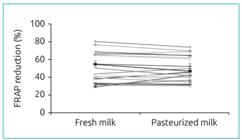ABSTRACT
Objective:
To evaluate the effect of pasteurization on antioxidant and oxidant properties of human milk.
Methods:
42 samples of milk before and after pasteurisation were used to evaluate the antioxidant activity by the ferric reducing capacity and by scavenging the 2,2’-azino-bis 3-ethylbenzthiazoline-6-sulfonic acid radical. Lipid peroxidation was estimated by the concentration of malondialdehyde product using the thiobarbituric acid reactive substances assay and by the evaluation of advanced oxidation protein products.
Results:
No significant difference was observed in fresh human milk and after pasteurization in relation to antioxidant properties determined by the ferric reducing capacity (50.0±3.4% and 48.8±3.0%, respectively) and by scavenging the 2,2’-azino-bis 3-ethylbenzthiazoline-6-sulfonic acid radical (28.9±1.5% and 31.2±1.3%, respectively). The results of malondialdehyde (62.6±4.1 and 64.3±3.6 µM/mg) and protein oxidation products (59.4±3.4 and 54.2±3.8 µM/L) of fresh and pasteurized milk, respectively, did not exhibited any significant difference.
Conclusions:
This data showed that human milk has an important antioxidant activity and that the pasteurizing process does not influence the antioxidant capacity, avoiding the peroxidation of breast milk lipids and the formation of advanced protein oxidation products.
Keywords:
Antioxidants; Milk banks; Oxidative stress; Milk, human; Pasteurization

 Thumbnail
Thumbnail
 Thumbnail
Thumbnail
 Thumbnail
Thumbnail
 Thumbnail
Thumbnail



